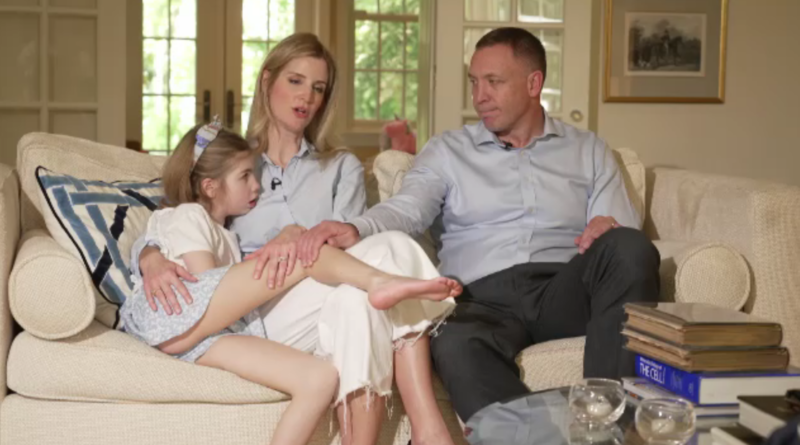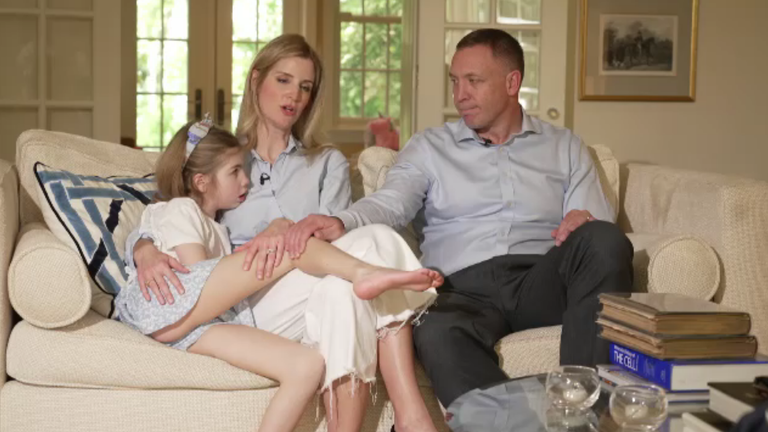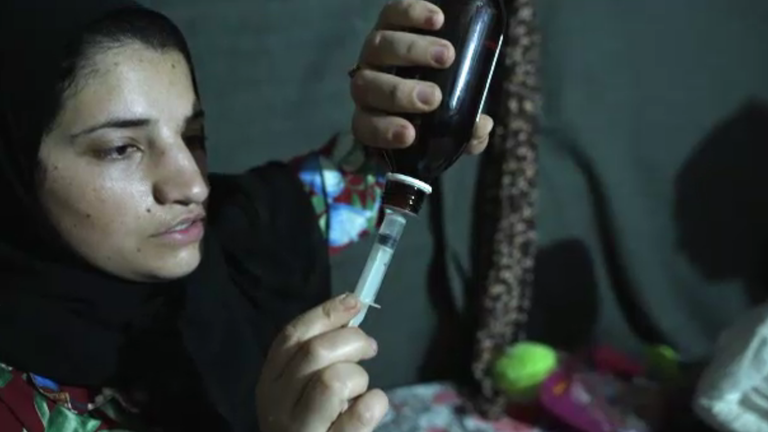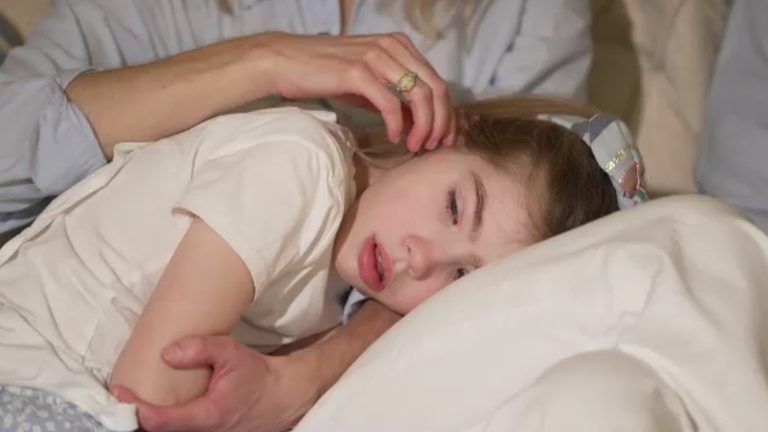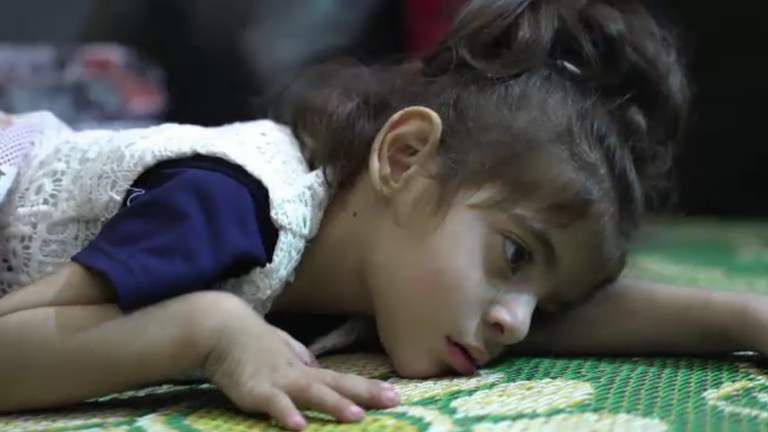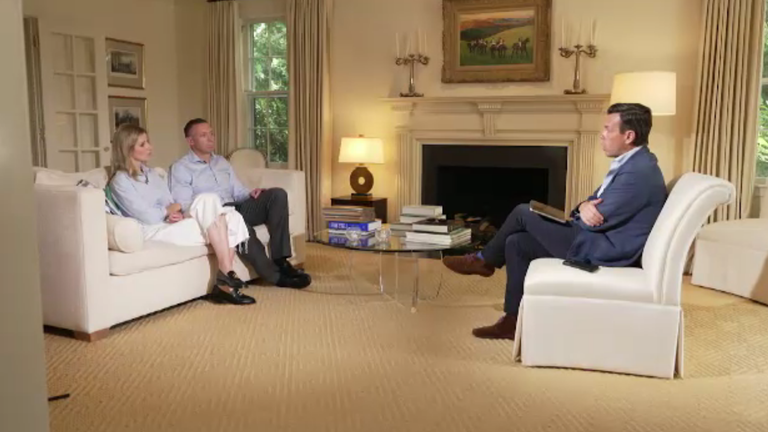Two families in Washington DC and Gaza come together through a rare disease: US News
It is a paradox that humanity at its very worst so often also brings out its very best too.
This is a story about the kindness of strangers. It’s a story about hope over hopelessness. It’s about the war in Gaza but also about the rarest of diseases.
It is about two families in worlds far apart. It is a story about two little girls, Julia and Annabel.
I don’t yet know how it will end. But this is how it started.
It was two weeks ago when my phone pinged: a message on Instagram from a friend-of-a-friend. Her name is Nina Frost.
Nina and I first met a few years ago at a party in Washington DC where she had told me about her daughter Annabel, a little girl with an ultra-rare genetic disorder called AHC.
I remember Nina explaining how it was a disease like no other.
‘The human time bomb disease’ she had called it, based on the all-consuming parental nightmare that their little girl could have a fatal seizure at any moment.
I’ve followed Nina’s Instagram, @HopeForAnnabel since we first met.
The good news is that Annabel is doing well, albeit with that eternal danger hanging over her. She requires constant care, attention and love.
Nina’s message to me wasn’t about her own daughter. It was about another little girl, in Gaza.
Rare diseases like AHC, which stands for Alternating Hemiplegia of Childhood, generate tight networks; the families living with the condition. Only about 1,000 people worldwide have been diagnosed with AHC. It really is rare.
“There is a little girl stuck in Gaza with the disease,” Nina wrote to me.
“Julia is three – after the last few months she has become paralyzed and unable to eat as her symptoms have worsened dramatically. We are desperate to help as she is massively vulnerable – literally on the brink of death.”
Nina told me how she and her husband, Simon, are trying to organise the impossible: to get specialist drugs into Gaza and, ultimately, to try to get Julia and her family out.
Nina was modest about an endeavour that I now know has been all-consuming and expensive.
To tell this remarkable story of kindness and hope, I asked Nina to share with me Julia’s father’s number. Our local colleagues in Gaza then tracked the family down to a tent in the southern city of Rafah.
Julia Abu Zaiter is from northern Gaza originally. But with her father Amjad, her mother Maha and her older sister Sham, she was forced south by the Israeli military.
“My girl is three and a half years old. I want her to go out and play with the other children. Now, she cannot move at all,” Julia’s mother told our team, cradling her severely disabled little girl.
Rafah is on Gaza’s southern border with Egypt. Safety is so close and yet beyond reach unless the right strings are pulled with different authorities and governments in a labyrinth of wartime bureaucracy.
The images filmed by our team confirm what Nina had feared in her message to me.
Julia and her family are in the toughest of conditions. The house next to the tent was bombed a few days before our team visited.
The Abu Zaiters are now stuck in the city that could be the next battlefield and with a daughter whose condition is compounded by just the slightest stress, a little girl with, as Nina had told me, the ‘time bomb disease’.
“I told myself ‘it’s over, my girl is gone’,” Julia’s mother told our Gaza team, showing them Julia’s semi-paralysed state.
“Then a man named Simon contacted us and told us he will see if he can help, because his daughter’s situation is similar to mine.”
Five thousand miles away, and a world apart, in a leafy northwest suburb of Washington DC, I am now sitting with Simon, Nina and Annabel.
It is humbling to listen to their words – about their own daughter, but about their fight for a stranger too.
“Annabel lives with the most challenging condition that we can imagine – a neurological degeneration – and she lives with it with a smile on her face,” Simon says. “And we’re imagining the same for Julia in the most dire of circumstances.”
We look at videos of Julia which Amjad has sent to Simon.
“Our kids are all so similar… we feel a sense of connection to so many families and our world of rare disease,” Nina tells me.
“This is like that but on steroids. I mean, we feel so distressed for the situation that they’re facing.”
“Julia’s circumstances are exponentially worse, but I think we’ve always embraced the idea that we can do something to help, we must do something to help and that we should. I mean, I think it’s always been if not us, then who?” Nina adds.
Amjad’s message highlights concerns he has about his daughter. He is looking for reassurance from Simon.
Julia is experiencing some severe paralysis and via a translated SMS and a few photos, Amjad wants some encouragement which Simon can’t give.
“They don’t have the medicines they need and the doctors that they need to really treat and properly prevent episodes and to address them when she has them,” Simon says.
“So we’ve been trying to gather a group that can support her. It’s been constant communication and really difficult with the translation issues,” Simon tells me.
Over in Gaza, Julia’s mum is desperate. “Our conditions due to the war are below zero.
“Our situation is horrible. I cannot provide my daughter with any food or drinks. I can get medications through lots of difficulty, and I tell myself that getting these medications is more important than getting food for us.”
Against the odds, Simon has managed to coordinate with the right people to get the right medication into Gaza for Julia.
Through the tight AHC network, one doctor has prompted another who knows another and another. That’s how this works. Threads of kindness stitched together.
Read more from Sky News:
Man charged over 1966 Illinois murder
Philippine coastguard hits out at China’s ‘brute force’
Inside pro-Palestinian protest as police break up UCLA encampment
Now the challenge is getting Julia out to Egypt and then on a medical flight to Abu Dhabi. It will be hard, maybe impossible.
“And it seems like she’s really declined,” Nina says looking at the latest videos of Julia.
“I mean, it seems like exactly what we would have predicted has happened. She has gone from being a happy three-year-old with a profoundly difficult disease to being this shell of herself.”
“I feel like I am losing her,” Maha says with Julia in her arms. “She is dying right next to me and I cannot even do anything. The thing I fear the most is losing my daughter.”
There is some chance of an extraction to safety soon. It is not guaranteed but it is some hope for one little girl in a place where uncertainty is all around.
This is a story about two families worlds apart but bound by a disease.
I don’t yet know how it will end. This may feel sometimes like a world of hopelessness, but I have some hope.
